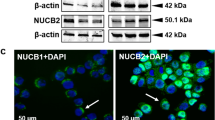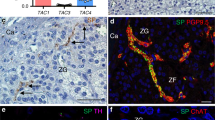Abstract
COBTICOTROPHIN, unlike insulin or the octapeptides of the posterior lobe of the pituitary gland, is known to exist in different biological forms, due to inconsistencies in bioassays in which various routes of administration are used. The first hormone preparations used were of the same type as the first and second International Standard, that is, crude Corticotrophin—a glacial acetic acid extract of pituitary glands. When in 1951 the oxycellulose adsorption method of Astwood et al.1 yielded a highly purified hormone, the bioassays carried out by subcutaneous injections into hypophysectomized rats showed, on the average, potency estimates three times greater than the classical assay method (Sayers test) which involves intravenous injection. This phenomenon led to a type distinction of oxycel-purified ACTH from crude Corticotrophin, the former being called Corticotrophin A (Wolfson2). Another attempt to purify Corticotrophin involving peptic or strongly acid hydrolysis yielded preparations of lower molecular size (about 28 amino-acid residues), which also differed biologically from crude Corticotrophin3. In this case the ratio of potencies observed after subcutaneous and intravenous comparison with the latter was reversed and of the order of 1 : 4. This third biological ACTH type was designated Corticotrophin B or actide (ref. 2). The foregoing ratios were obtained in rats but appear, in the main, to agree with those in man so far as crude Corticotrophin and Corticotrophin A are concerned. Bearing in mind that ACTH is mainly given subcutaneously (extravascularly), Corticotrophin A may be regarded as the most important type of native ACTH due to its high degree of purity and favourable efficiency when given extravascularly. It is partly for these reasons that the now official International and U.S.P. Corticotrophin Standard preparations are of the corticotrophin A type, a fact which has practically eliminated bioassay discrepancies (crude corticotrophin is now rarely used). The reasons for the foregoing bioassay discrepancies are unknown, but it is most likely that they lie in the different rates of inactivation of the different types of ACTH at the site of extravascular administration.
This is a preview of subscription content, access via your institution
Access options
Subscribe to this journal
Receive 51 print issues and online access
$199.00 per year
only $3.90 per issue
Buy this article
- Purchase on Springer Link
- Instant access to full article PDF
Prices may be subject to local taxes which are calculated during checkout
Similar content being viewed by others
References
Astwood, E. B., Raben, M. S., Payne, R. W., and Grady, A. B., J. Amer. Chem. Soc., 73, 2969 (1951).
Wolfson, W. Q., Arch. Intern. Med., 92, 108 (1953).
Ingle, D. J., and Li, C. H., Proc. Soc. Exp. Biol. and Med., 79, 128 (1952).
Rerup, C., and Hedner, P., Acta Endocrinol., 44, 237 (1963).
The United States Pharmacopeia, fifteenth revised edition (1955).
Author information
Authors and Affiliations
Rights and permissions
About this article
Cite this article
RERUP, C. Incompatibility of Synthetic Tetraicosapeptide Corticotrophin with the Present U.S.P. and International Corticotrophin Standard. Nature 209, 89–90 (1966). https://doi.org/10.1038/209089a0
Issue Date:
DOI: https://doi.org/10.1038/209089a0
Comments
By submitting a comment you agree to abide by our Terms and Community Guidelines. If you find something abusive or that does not comply with our terms or guidelines please flag it as inappropriate.



